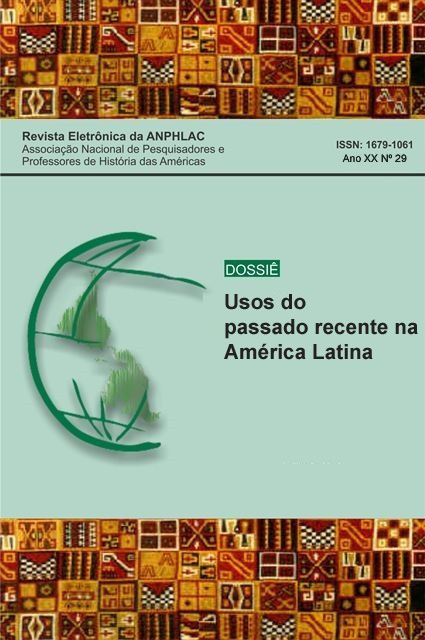A Present’s History: The Intellectual Discourse About the Past in Nexos and Vuelta in the Mexican Democratic Transition (1982-1992)
DOI:
https://doi.org/10.46752/anphlac.29.2020.3912Keywords:
Mexican democratic transition, Cultural Magazine, IntellectualsAbstract
This paper seeks to explore the discourses about the past in Nexos and Vuelta, the two largest cultural publications during the Mexican democratic transition, in the 1980s and 1990s. The intellectual groups gathered around these cultural magazines fostered discussions about their political present through historical themes and views on the Mexican past, which led to debates around the “official history” and the historiographic revision undertaken in Mexico in the last decades of the twentieth century. Taking intellectual history as a theoretical framework, the article analyzes texts by three renowned historians linked to those magazines: Héctor Aguilar Camín, Enrique Florescano and Enrique Krauze. Studying the relations between historical narratives and political projects in intellectual discourses, the paper emphasizes the use of history as a form of criticism of the Mexican political system, then dominated by the PRI.
Downloads
References
ALTAMIRANO, Carlos e Jorge Myers. Historia de los intelectuales en América Latina. Buenos Aires; Madrid: Katz Editores, 2008.
ARAUJO PARDO, Alejandro. Guillermo Bonfil Batalla. Mexico Profundo (1987). In: Illades, Carlos e Rodolfo Suárez (org.). México como problema: esbozo de una historia intelectual, p. 343–363. México: Siglo Veintiuno Editores, 2012.
BABB, Sarah. Proyecto: México. Los economistas del nacionalismo al neoliberalismo. México: FCE, 2003.
CABALLERO ESCORCIA, Boris. Hegemonía cultural disputada en México. Las revistas Nexos y Vuelta enfrentadas (1990-1992). Anuario de Historia Regional y de Las Fronteras, vol. 25, n. 2, p. 149–186, 2020. https://doi.org/10.18273/revanu.v25n2-2020006
CAMP, Roderic A. Intellectuals: Agents of Change in Mexico? Journal of Interamerican Studies and World Affairs, vol. 23, n. 3, p. 297-320, 1981. https://doi.org/10.2307/165549
__________. An Image of Mexican Intellectuals, Some Preliminary Observations. Mexican Studies/Estudios Mexicanos, vol. 1, n. 1, p. 61–82, 1985a. https://doi.org/10.2307/1051980
_______________. Intellectuals and the State in Twentieth-Century Mexico. Austin: University of Texas Press, 1985b.
_______________. The Revolution’s Second Generation: The Miracle, 1946-1982 and Collapse of the PRI, 1982-2000. In: Beezley, William (org.). A Companion to Mexican History and Culture, pp. 468–79. Wiley-Blackwell, 2011.
CLAVIJO, Fernando e Susana Valdivieso. Reformas estructurales y política macroeconómica. In: Clavijo, F. (org.). Reformas Económicas En México, 1982-1999. México: FCE; CEPAL, 2000.
CONCHEIRO, Luciano, Ana Sofía Rodríguez e Álvaro Ruiz Rodilla. Las décadas de Nexos (1978-1997) - Tomo I e II. México: FCE, 2018.
CRESPO, Regina. Revistas culturais e literárias latino-americanas: objetos de pesquisa, fontes de conhecimento histórico e cultural. In: Franco, S. e M. A. Junqueira (org.). Cadernos de Seminários de Pesquisa, p. 98-115. São Paulo: Usp/Humanitas, 2011.
FLORES, Malva. Un cuartel general hispanoamericano. Inicio y consolidación de la revista Vuelta (1976-1998). In: Crespo, R. (org.). Revistas en América Latina: proyectos literarios, políticos y culturales, p. 503-536. México: UNAM/Eón, 2010.
GALLEGOS CRUZ, Cristhian. La escritura de la democracia: un estudio sobre las transformaciones de lo político y los discursos intelectuales en las revistas Vuelta y Nexos (1976-2000). Dissertação de mestrado. Instituto Mora, México, 2018.
GAWRONSKI, Vincent T. The Revolution Is Dead. ¡Viva La Revolución!: The Place of the Mexican Revolution in the Era of Globalization. Mexican Studies/Estudios Mexicanos, vol. 18, n. 2, p. 363-397, 2002. https://doi.org/10.1525/msem.2002.18.2.363
GIL, Antonio Carlos Amador. As ciências sociais ao serviço do colonialismo? A antropologia aplicada, o auge do indigenismo e sua crise no México da segunda metade do século XX. Dimensões, vol. 29, p. 309-332, 2012. http://periodicos.ufes.br/dimensoes/article/view/5410
GREAVES, Cecilia. La Secretaría de Educación Pública y la lectura, 1960-1985. In: Historia de la lectura en México, editado por Seminario de Historia de la Educación de México. México: El Colegio de México, 1997. https://doi.org/10.2307/j.ctv3dnrj8.11
ILLADES, Carlos. El marxismo en México: una historia intelectual. México: Taurus, 2018.
LOMNITZ, Claudio. An Intellectual’s Stock in the Factory of Mexico’s Ruins. American Journal of Sociology, vol. 103, n. 4, p. 1052–65, 1998. https://doi.org/10.1086/231298
_______________. Narrating the Neoliberal Moment: History, Journalism, Historicity. Public Culture, vol. 20, n. 1, p. 39–56, 2008. https://doi.org/10.1215/08992363-2007-015
MATUTE, Álvaro. La historia en México (1984-2004). Mexican Studies/Estudios Mexicanos, vol. 20, n. 2, p. 327-342, 2004. https://doi.org/10.1525/msem.2004.20.2.327
_______________. Aproximaciones a la historiografía de la Revolución Mexicana. México: UNAM, 2005.
MYERS, Jorge. Músicas distantes. Algumas notas sobre a história intelectual hoje: horizontes velhos e novos, perspectivas que se abrem. In: Sá, Maria Elisa Noronha (org.). História intelectual latino-americana: itinerários, debates e perspectivas, Rio de Janeiro: Ed. PUC-Rio, 2016.
O’TOOLE, Gavin. The Reinvention of Mexico: National Ideology in a Neoliberal Era. Liverpool University Press, 2010.
ORNELAS, Carlos. El sistema educativo mexicano: la transición de fin de siglo. México: FCE, 2016.
POCOCK, John G. A. Linguagens do Ideário Político. São Paulo: Edusp, 2003.
RODRÍGUEZ KURI, Ariel. Challenges, Political Oposition, Economic Disaster, Natural Disaster and Democratization, 1968 to 2000. In: Beezley, William (org.). A Companion to Mexican History and Culture, p. 493–504. Wiley-Blackwell, 2011.
ROUSSEAU, Isabelle. México ¿Una Revolución Silenciosa? Élites gubernamentales y proyecto de modernización, (1970-1995). México: El Colegio de México, 2001. https://doi.org/10.2307/j.ctv3dnrkr
SALAZAR CARRIÓN, Luis. Enrique Krauze. Por Una Democracia Sin Adjetivos (1983). In: Illades, Carlos e Rodolfo Suárez (org.). México como problema: esbozo de una historia intelectual, p. 155–167. México: Siglo Veintiuno Editores, 2012.
SALMERÓN SANGINÉS, Pedro e Pablo Serrano Álvarez. El auge de la historiografía política regionalista en México, Revisionismo y análisis político, 1968-2000. Secuencia, n. 57, p. 183-200, 2003. http://dx.doi.org/10.18234/secuencia.v0i57.829
SÁNCHEZ PRADO, Ignacio M. The Democratic Dogma: Héctor Aguilar Camín, Jorge G. Castañeda, and Enrique Krauze in the Neoliberal Crucible. In: Castillo, D. e Stuart A. Day. Mexican Public Intellectuals, p. 15–44. New York: Palgrave Macmillan, 2014.
SHEPPARD, Randal. A Persistent Revolution: History, Nationalism, and Politics in Mexico since 1968. Albuquerque: University of New Mexico Press, 2016.
SOARES, Gabriela Pellegrino. Semear horizontes: uma história da formação de leitores na Argentina e no Brasil, 1915-1954. Belo Horizonte: Editora UFMG, 2007.
SOARES, Gabriela Pellegrino. Letramento e mediações culturais em ‘pueblos’ indígenas do centro-sul do México no século XIX. História Revista, vol. 15, n. 1, p. 97–118, 2010. https://doi.org/10.5216/hr.v15i1.10821
VARGAS ESCOBAR, Natalia. La historia de México en los libros de texto gratuito: Evidencia de las transformaciones en los modelos de integración nacional. Revista Mexicana de Investigación Educativa, vol. 16, n. 49, p. 489-523, 2010. http://www.scielo.org.mx/scielo.php?script=sci_arttext&pid=S1405-66662011000200008
WOLDENBERG, José. Historia Mínima de La Transición Democrática En México. México: El Colegio de México, 2012.
Downloads
Published
Versions
- 2020-12-16 (2)
- 2020-12-16 (1)
How to Cite
Issue
Section
License
a. Cessão de direitos autorais
Venho, por meio desta, ceder em caráter definitivo os direitos autorais do artigo "____________", de minha autoria, à Revista Eletrônica da ANPHLAC e afirmo estar ciente de que estou sujeito às penalidades da Lei de Direitos Autorais (Nº9609, de 19/02/98) no caso de sua infração. Autorizo a Revista Eletrônica da ANPHLAC a publicar a referida colaboração em meio digital, sem implicância de pagamento de direitosautorais ou taxas aos autores.
b. Declaração de ineditismo e autoria
Atesto que o artigo ora submetido à Revista Eletrônica da ANPHLAC, intitulado "________________________", de minha autoria, nunca foi publicado anteriormente, na íntegra ou em partes, dentro do país. Vindo a ser publicado na Revista Eletrônica da ANPHLAC, comprometo-me a não republicá-lo em qualquer outro veículo editorial.






